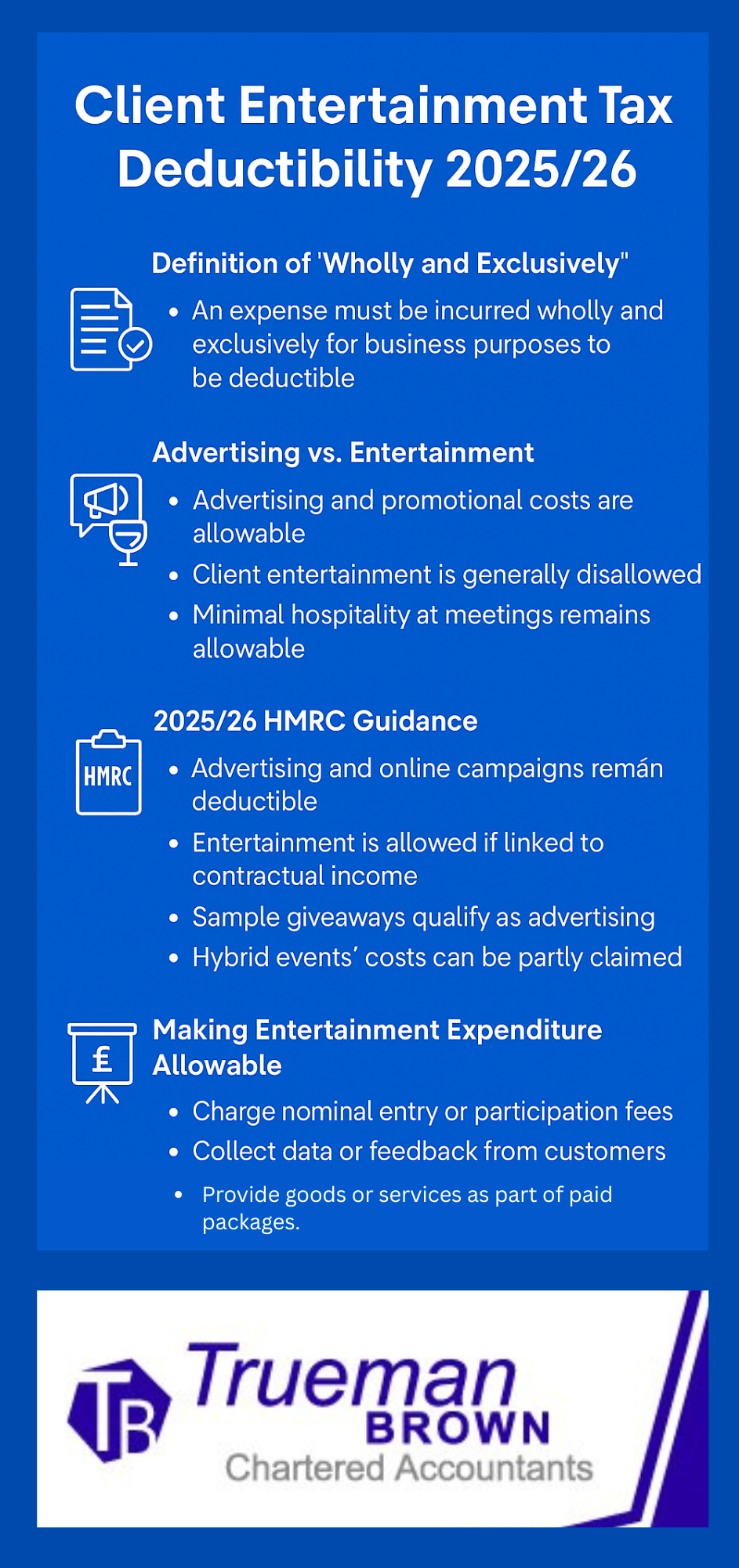Client Entertainment Tax Deductibility: What’s Allowable in 2025/26?
Understanding client entertainment tax deductibility is crucial for UK businesses aiming to stay compliant while maximizing legitimate deductions.
The rules on what qualifies as advertising or entertainment can be confusing, but the difference can have major tax implications.
What Does ‘Wholly and Exclusively’ Mean?
For an expense to be deductible, it must be incurred wholly and exclusively for business purposes.
Unlike employee expenses, necessity isn’t required—but personal or mixed-use costs are disallowed.
Advertising vs. Entertainment – Where’s the Line?
Advertising and promotional costs remain allowable.
However, client entertainment tax deductibility is strictly limited under HMRC’s rules.
Any hospitality—such as meals, drinks, or events—offered free of charge is considered entertainment and cannot be claimed, unless it’s minimal or incidental to the business activity.
Real Case Example: Netlogic Consulting Ltd
In Netlogic Consulting Ltd v HMRC [2005], a company’s event costs were largely disallowed as entertainment, except for venue hire.
The court held that the entertainment was incidental to the promotion, confirming that client entertainment tax deductibility depends on intent and context.

What’s Changed for 2025/26 On Client Entertainment Tax Deductibility ?
HMRC’s 2025/26 guidance reaffirms:
-
Advertising and promotion (including online campaigns and sample giveaways) remain deductible.
-
Client entertainment, including meals, tickets, or hospitality events, continues to be disallowed unless directly linked to a contractual obligation that generates taxable income.
-
Minimal hospitality (tea, coffee, biscuits at meetings) remains allowable.
-
Hybrid events (e.g., trade shows with paid admission) can claim part of costs as promotional where a commercial return is demonstrated.
Making Entertainment Expenditure Allowable
Businesses can structure spending to meet client entertainment tax deductibility criteria:
-
Charge nominal fees for entry or participation.
-
Collect customer data or feedback in return for hospitality.
-
Provide goods or services as part of paid packages.
Trueman Brown: Your Partner in Getting It Right On Client Entertainment Tax Deductibility
Navigating client entertainment tax deductibility can be complex.
Trueman Brown Chartered Accountants provide expert guidance to help businesses interpret HMRC rules, separate allowable from disallowed expenses, and maintain accurate records.
📧 mark@truemanbrown.co.uk
📞 01708 397262
Whether you’re running client events, promotional campaigns, or trade shows, we ensure your claims stand up to scrutiny.
FAQ: Client Entertainment Tax Deductibility
Q1: Can I claim a client lunch as a deductible expense?
No. Client meals are considered entertainment and not deductible, even if business is discussed.
Q2: Are staff parties deductible?
Yes, annual staff parties up to £150 per head remain allowable, but only for employees—not clients.
Q3: Can branded gifts be deducted?
Yes, if they cost less than £50, carry a business logo, and aren’t food, drink, or tobacco.
Q4: What about online promotional giveaways?
Yes, as long as they promote your business and aren’t part of entertainment.

Recent Comments